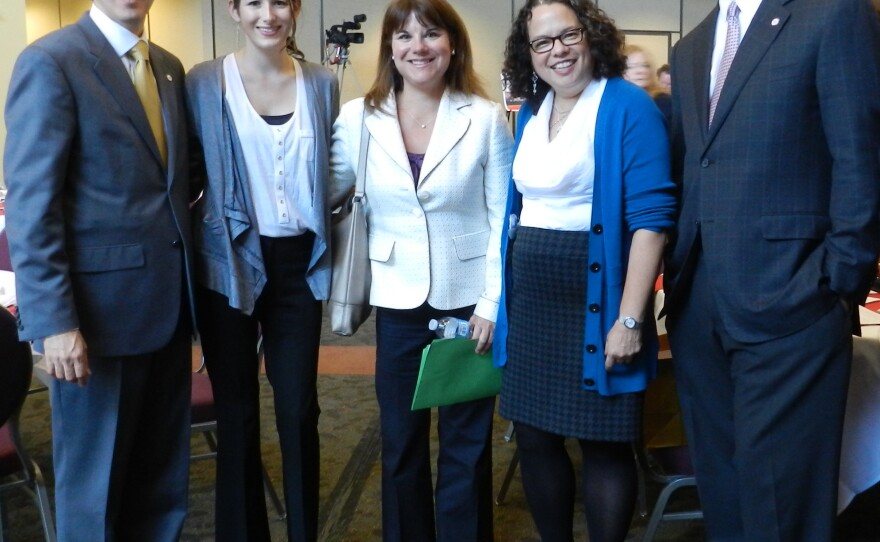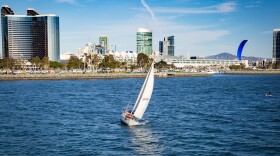Ray King can be quietly thoughtful and reserved when you first meet him. But ask him about his childhood in New York and soon he’s waxing poetic. And, it’s not hard to understand why.
“I grew up in Brooklyn,” he says with a hint of sentimentality. “And, I’ve always had a fondness for New York. You couldn’t find a kid who hadn’t been to Broadway, or the main library in Manhattan, or to the Bronx Zoo or Central Park. We were some of the luckiest kids on the face of the earth because we had it all in our backyard.”
King, who is President and CEO of the Urban League of San Diego County, attributes the upbeat themes embodied in the New York musical theater scene for the optimistic vision he has today.
“I was raised singing Broadway show tunes and believing in idealistic visions of what the future could hold,” he says. “Like the song, ‘Climb Every Mountain.’ I think that’s why I’m a firm believer that talent is equally distributed across groups, potential should be realized and everyone has an obligation to give back to society. I know it sounds corny.”
King, who gives back to society through his work at the Urban League, would spend the school year in New York. But, summers were spent in the Deep South, far from the noisy din of city life. And, where “separate but equal,” was still the order of the day.
His mother’s family had a farm just outside a small town in South Carolina. Though there’s no bitterness in King’s voice as he remembers those summers long ago, it’s clear the experience left its mark.
“I had a very early introduction to racism and segregation,” King recalls. “Our family farm was in a small town that was segregated. I never walked through the downtown section of that town. One side was black, one side white. The movie theater was on the white side of town. Long after segregation was illegal, that movie theater was still segregated. Blacks went upstairs through the back door, and whites used the front door.”
“Even after the Civil Rights Movement, it remained a backwards town,” he somberly adds. “I never drove through the white part of town, but always out the other way. So, I never knew what that town looked like until college, when I saw it on television in some sort of documentary. And, I was shocked.”
The experience of straddling two very different worlds—liberal New York and the segregated South—propelled King to want to help others.
“I’m all for helping my neighbors and people in poverty,” he acknowledges. “I am totally convinced that none of us can move forward without bringing along the rest of society. I know that I’m a product of all the people who helped me get where I am today. “
This includes his parents. “They always made me care about education,” he says. “We understood the absolute importance of getting that diploma and being on the track system for college.”
King attended University of Hartford in Connecticut and received his Masters in Business Administration from the Stanford Graduate School of Business. His career, prior to joining the Urban League, includes working in the corporate world as the general manager for marketing and operations of a transportation outfit that had him traveling to Asia, Europe and South America. He’s also been involved in city government.

As he begins his sixth year at the Urban League, King is feeling confident. The way he sees it, with a new mayor, things could be looking up for the communities the Urban League serves. He believes that much of the focus in San Diego has been on tourism development, but now he’s hoping neighborhoods like Golden Hill and Southeast San Diego will start to get some attention.
“It’s not a good thing when you see Southeast, which is about a mile from downtown, be a million light-years away, economically. There’s something wrong with that. We could be creating jobs in this area. The University area is an employment hub. Sorrento Valley is, and so is downtown. Something needs to be done about employment this way. That’s my objective—to speak about it and articulate why it’s good, and why it’s good for the entire community.”
The Urban League was founded over 100 years ago to serve the African American community, but here in San Diego, that’s not necessarily the case. “The black community is small and highly dispersed geographically,” King notes. “Our service area is very diverse, so there’s no way we’re not going to serve a diverse population.”
According to King, the San Diego Urban League, which has four core goals—education, jobs, housing and health—each year serves 5,300 African Americans, Latinos, Asians, as well as other ethnicities.
“We are a capacity building organization for the community,” he explains, “enabling the community to reach its full potential by enabling other small institutions and individuals to pursue their talent.”
As someone whose personal experience made him “treasure education, and the importance of it,” one of King’s favorite Urban League activities is the Golden Pyramid Scholars Award ceremony, which recognizes students in grades 1-12 who have achieved a GPA of 3.0 or higher.
“I recall a parent telling me how their child received his first Golden Pyramid medal and slept with it for three days,” says King. “He wouldn’t take it off because he was so proud of that accomplishment, and that’s what we want to see. We want to impact children so much so that they think to themselves, ‘I’ve had a great accomplishment. I’d like to do it again, and I want all my friends and family to know what I’ve done.’”
The Urban League was founded just over a century ago, and being in charge of such a recognized institution can be a double-edged sword.
“It’s good because you have the longevity,” King observes. “It’s bad because you have to freshen the brand and redefine the identity.”
To work on the brand and identity, King has big plans in the works. “I want the Urban League to do some real estate development. I want us to start a for-profit service business—something as simple as plumbing and maintenance, or senior care. Things that directly benefit the community but also give us the opportunity to create employment opportunities. I’m completely excited about this and can’t wait to get started. We want to be an incubator for this sort of development.”
In looking ahead, King considers the future for San Diego and the Urban League. “San Diego is a wonderful community with great prospects, and of all the opportunities I’ve had to contribute, and all the employment opportunities I’ve had, the Urban League is the most challenging and the most rewarding.”






